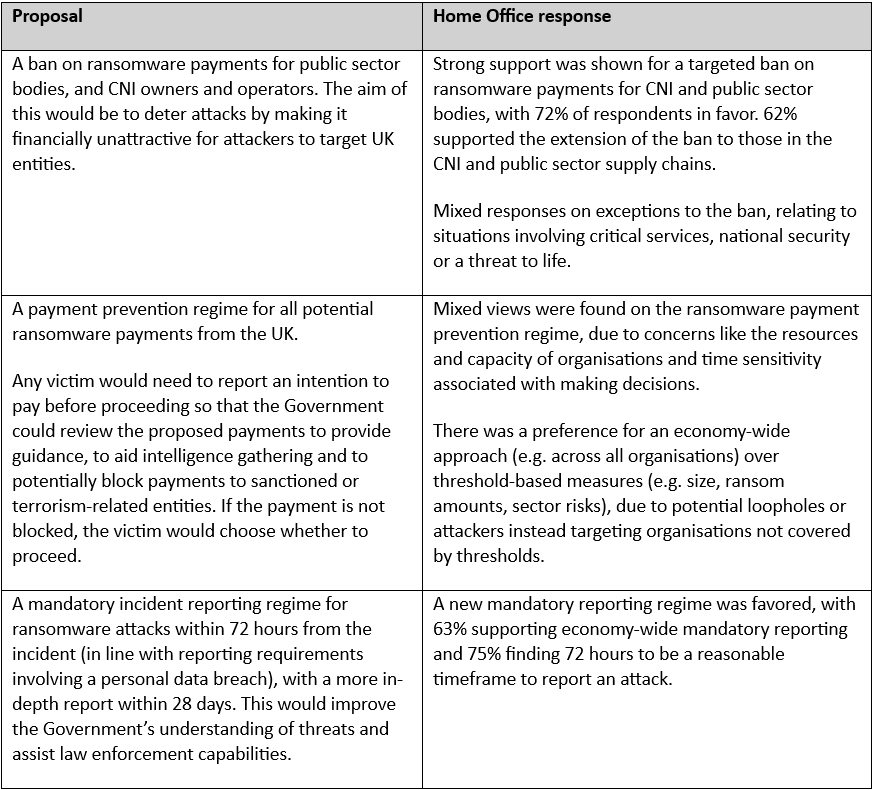UK Government's take on ransomware: Insights from the recent consultation
Client Alert | 14 min read | 07.24.25
Ransomware attacks have escalated in frequency and sophistication, posing a significant threat to national security and critical national infrastructure (“CNI”). Cybersecurity has emerged as a core pillar of the UK’s national defence strategy, as set out in the recent Strategic Defence Review. The Government has recognised cyber as a crucial area for modern conflict. Ransomware attacks are a significant method of attack, as a form of cybercrime which involves malicious software encrypting data and a ransom demand for its restoration or to prevent its publication. The UK has experienced a notable rise in such incidents, including attacks on Synnovis (an NHS diagnostics service provider) and Southern Water (a water company providing water to a region of the UK), both in 2024.
In response to these mounting risks, the UK Home Office launched a consultation to explore new measures and issued their response on 22 July 2025, outlining steps and proposals to strengthen the country’s cyber resilience.
Key proposals in the consultation and responses
The consultation, conducted from January to April 2025, outlined three main proposals. The Home Office’s responses are summarised in the table below.

It’s not clear at this stage to what extent these proposals will make up the UK Government’s legislative reform, so this is an area to keep a close eye on.
Commentary and conclusion
The Home Office aims to improve intelligence gathering, reduce payments to ransomware criminals, and enhance international cooperation to combat ransomware threats. However, several aspects remain uncertain. The responses do not clearly define the scope of each proposal, such as whether they extend to the supply chain or apply economy-wide. It is also unclear how these measures will affect international companies, especially those that might make payments through non-UK entities. A comprehensive package of victim support and guidance from the Government or other authorities will be essential for those facing this type of cyber threat. The Government might also consider other approaches to address the consultation responses, possibly through the Cyber Security and Resilience Bill.
Organisations should prepare for potential reporting requirements and anticipate revising their cybersecurity strategies by consulting subject matter experts. Businesses may be worried about disruptions caused by reforms, so guidance from the Government and other authorities will be crucial to help navigate any new requirements. These changes will likely impact the cyber insurance policy landscape, as some policies currently cover ransom payments.
The UK Government's recent focus on cybersecurity, particularly regarding ransomware payments, represents a significant step in the fight against cyber threats. This initiative aligns with the increased attention on cybersecurity and AI risks, as discussed in our earlier article. The National Cyber Security Centre (“NCSC”) has highlighted the emerging digital divide due to AI-enhanced cyber threats, with similar sentiments reflected in the voluntary Codes of Practice for the Cyber Security of AI and Software Security. There is a critical shift towards cyber resilience and security, and organisations must adapt to ensure their operations remain secure and resilient against evolving cyber threats, regardless of whether they fall within the scope of any legislative reform.
Contacts
Insights
Client Alert | 3 min read | 02.13.26
In October 2024, the FTC adopted a final rule that substantially modified the HSR form, requiring new categories of information and documents. The final rule was the most significant overhaul of the HSR premerger notification requirements in decades. The new requirements imposed additional time and expense on merging parties, with the FTC estimating that the new form would likely take triple the amount of time to complete than the previous form. Numerous groups, including the U.S. Chamber of Commerce, sued to challenge the rule.
Client Alert | 12 min read | 02.13.26
What Organ Procurement Organizations Need to Know About CMS's New Proposed Rule
Client Alert | 9 min read | 02.12.26
Client Alert | 3 min read | 02.12.26





